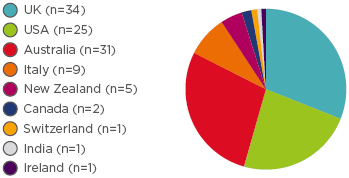BACKGROUND
People with head and neck cancer frequently have symptoms that are caused by their disease or by their treatments, which may significantly impact on their quality of life living with and beyond cancer.1-5 This international research survey captured a self-rating report by people who have had radiotherapy (RT) treatment for head and neck cancer regarding their experience of oral symptoms, including dry mouth (xerostomia).
METHOD
This survey was designed by patients, and then submitted for ethical approval in collaboration with a healthcare researcher. The international survey was open to anyone >18 years old who had had treatment for head and neck cancer, whether or not they currently had symptoms of dry mouth. The electronic survey was in English and the ethical permissions granted that patients who wished to take part could request assistance, if needed, due to illness, fatigue, confidence in accessing the internet, or English literacy. Participant recruitment was supported through a wide range of networks including healthcare practitioners, charities, and patient support groups. The average time to complete the 18-item survey was <10 minutes, including both multiple choice and open questions. Statistical analysis reflected correlations between the participant demographics and self-reporting of symptoms. An interpretive analysis of free text responses highlighted patient values and priorities.
RESULTS
Over 100 individuals responded to the survey from across the UK, USA, Canada, Australia, India, and mainland Europe. Almost 75% of respondents (74.54%) stated that they had experienced dryness in the mouth or throat at least 50% of the time over the past 7 days. Furthermore, the results demonstrated that few respondents had received much information about dry mouth; >78% stated they had either received very little information or no information about the possible symptoms of dry mouth. Additionally, 88% of respondents stated that their oncologist had given them no advice about protecting their salivary glands via protective treatments. The analysis demonstrates patterns between the patient demographics, types of radiotherapy treatments, time since treatment, and current symptoms. This is the first time that this original dataset was presented. The findings also generated insights into the self-reported impact of these symptoms on patients’ quality of life.
CONCLUSION
This study comprises important evidence of patients’ experiences and symptoms post-treatment. The cross-sectional dataset also indicates the global view of recent and current RT treatment approaches. Future collaborative studies between researchers, patient groups, and pharmaceutical companies are imperative.
This research was presented by a patient advocate. The poster was awarded first prize for Best Poster at the ESMO 2018 conference.

Figure 1: The proportion of total survey responders by country.








